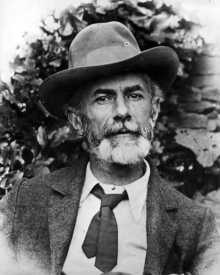Book Review: ‘Towards Democracy’
The simple life
‘Towards Democracy’ by Edward Carpenter. £5.95
 After nearly forty years of neglect, the works of Edward Carpenter have been re-issued, attracting considerable interest. Towards Democracy draws together all four parts of the series of Whitmanesque prose poems originally published between 1883 and 1902 and may reasonably be regarded as his manifesto.
After nearly forty years of neglect, the works of Edward Carpenter have been re-issued, attracting considerable interest. Towards Democracy draws together all four parts of the series of Whitmanesque prose poems originally published between 1883 and 1902 and may reasonably be regarded as his manifesto.
Carpenter’s work defies categorisation: a sincere and compassionate man, he was identified with nearly every Left Wing and reformist movement of his time from Christian Socialism to anarchism; from vegetarianism to women’s suffrage; from penal reform to pollution control, with oriental mysticism thrown in for good measure.
But it is for his championing of homosexual rights at a time when it was both illegal and dangerous to do so that he is perhaps best remembered.
Carpenter deliberately adopted a simple open-air life and rejected conventional ways, preferring to live by manual work rather than use his university education and privileged connections to further a career. And it is this love of natural simplicity and rejection of pretentiousness and industrial ugliness which can be seen in his writings. Democracy, for Carpenter, was more of a personal than a political statement and, except that some of his poems are beautifully written, they will have limited appeal to socialists. But there are times when his indignation at the way in which capitalism impoverishes workers’ lives leads to an indictment of the factory system.
She lies whom Money has killed, and the greed of Money.
The thrice-driven slave, whom a man has calmly tortured.
And cast away in the dust – and calls it not murder.
Because he only looked on; while his trusted lieutenants
Supply and Demand pinned the victim down –
and her own mother Nature slew her!
The old story of the sewing machine – the treadle machine;
Ten hours a day and five shillings a week, a penny an hour or so – if the numbers were of importance.
Of course she fell ill. Indeed she had long been ailing, and the effort and the torture were slowly disorganising her frame; and already the grim question had been asked “Might she have rest?” (the doctor said must and for many a month, too).
And the answer came promptly as usual. “Have rest? – as much as she wanted! It was a pity, but of course if she could not work she could go. They would make no difficulty, as Supply would fill up her place as soon as vacant”.
One more struggle then. And now she must go, for work is impossible, and Supply has filled her place, and there is no difficulty – or difference – except to her. (pp. 108-109)
In the poem Sheffield Carpenter draws a picture of the drabness of industry, contrasting it with the beauty of the nearby countryside:
. . . the file-cutter humped over his bench, with ceaseless skill of chisel and hammer cutting his hundred thousand file-teeth per day – lead poison and paralysis slowly creeping through his frame;
The gaunt woman in the lens grinding shop, preparing spectacle-glasses without end for the grindstone – in eager dumb mechanical haste, for her work is piecework
Barefoot skin-diseased children picking the ash- heaps over,
Sallow hollow-cheeked young men. prematurely aged ones,
The attic, the miserable garret under the defective roof.
The mattress on the floor, the few coals in the comer,
While jets of steam, long ribbons of black smoke. Furnaces glaring through the night, beams of lurid light thrown obliquely up through the smoke . . . (p.363)
Carpenter’s radicalism sprang from his generous nature, he fought on the side of every reformist movement imaginable, trying to remove the symptoms of capitalism instead of the system itself. His confused ideas led him to support the Labour Party and syndicalism at the same time; to reject his early Christian beliefs but embrace oriental mysticism; to call himself an anarchist but have a seat on his local council. And yet the man who was a friend of William Morris and whose simple lifestyle influenced News from Nowhere cannot be dismissed lightly. But the final verdict must be one of regret that such a sincere and gifted man ended up in the blind alley of reformism instead of finding a road to socialism.
Carl Pinel
